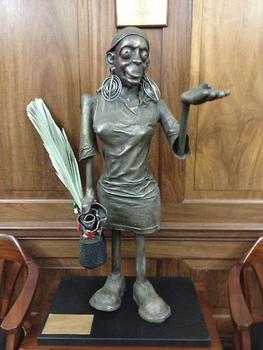 A statue of Wanjiku at the CJ's office during Dr. Willy Mutunga's tenure CREDIT: @WMutunga
A statue of Wanjiku at the CJ's office during Dr. Willy Mutunga's tenure CREDIT: @WMutunga In a normal democracy, these are minor items which we shouldn't be debating because they're obvious. Judiciary independence should be a given. Technology should work. Accurate figures should be sent from polling stations. The technicalities of elections should be such a non-issue, that by now Kung Fu Panda should be running for president and an avocado should be on the Nairobi governor ballot. Like seriously. Like Lord Buckethead run against Theresa May.
And yet, that was the perfect time to have a conversation about why half of Kenya was not just disappointed, but grief stricken. Three years earlier, we had ratified a new constitution, because we wanted the end of the tyranny of the rich. We wanted an end to the feudal system where the size of land guarantees you power. But the system we were trying to vote out, which had even opposed the new constitution, remained firmly in place. The elections had shut out the voice of Wanjiku, the voice with which we had affirmed the new constitution. And when Wanjiku wept, she was told to accept and move on.
Artists tried to appeal against this callousness. At the end of March 2013, Rasnah Warah told us about that grief. She said Wanjiku's "50-year old heart stopped, just like that," and there were no funeral rites to mourn her. Three months later, 10 writers tried again, in an edition of New Inquiry called #KenyaRefuses. In that volume, Keguro Macharia reminded us that "something has died," Wambui Mwangi out-ted the "the ideological erasure of the many other ethnic communities in the Kenyan story as told by Gikuyu men," and Orem Ochiel revealed how the "peace" we had just emerged from was a farce.
Two years later, I picked Keguro's theme of grief and sang the blues, and just two months ago, Aleya Kassam sang a ghazal. But the “accept and move on-ers” still didn't get it. They continued to swim like the proverbial frog as the water got warmer.
They refused to understand that the grief of 2013 wasn't just about Raila losing. It was about the victory of impunity. It was about the end of trust. It was about the loss of faith in Constitutional institutions to address the failures in counting.
The “accept and move on-ers” didn’t realize that “accept and move on” meant that in the 2017 elections, Wanjiku would want an account of every BVR kit and every name on the register. Wanjiku would examine every printing tender, and monitor every polling station, and go to court over tenders. “Accept and move on” meant that Wanjiku wouldn’t accept even a sniff of impropriety. “Accept and move on” meant that Wanjiku would be so adamant about credible elections, that Wanjiku wouldn’t listen to campaigns about peace, the same campaigns she grudgingly accepted in 2013. “Accept and move on” meant that those who believed in it were considered to have decided they were too good to be Wanjiku, yet they too, are Kenyan voters and just as vulnerable as Wanjiku.
“Accept and move on-ers” had four years to understand where Wanjiku was coming from. But they didn’t want to know. Wanjiku sent Rasnah Warah, Shailja Patel, Keguro Macharia, Wambui Mwangi, Orem Ochiel, Odwiri Oduor, Kenne Mwikya, Marziya Mohammedali, Ngwatilo Mawiyoo, and Michael Onsando to explain. But “accept and move on-ers” wouldn’t listen. Some would even laugh at Wanjiku.
So this discomfort with the drama around the elections is what “accept and move on” means, and this is what Wanjiku has been trying to explain for the last four years. And it is not too late for “accept and move on-ers” to understand, and join Wanjiku.
 RSS Feed
RSS Feed
